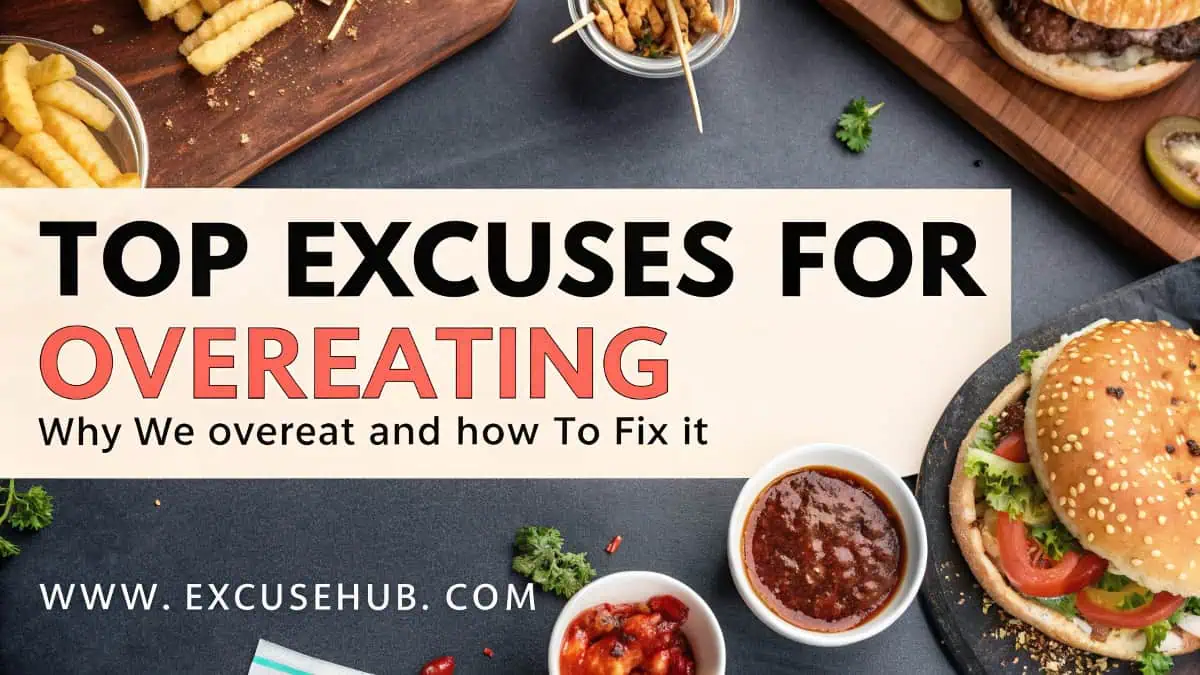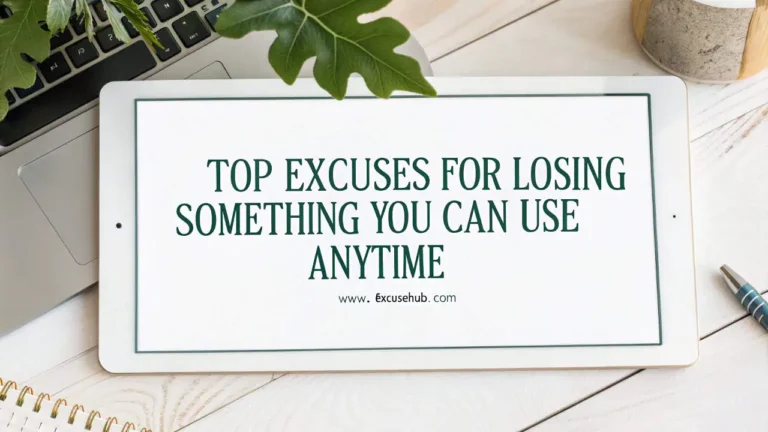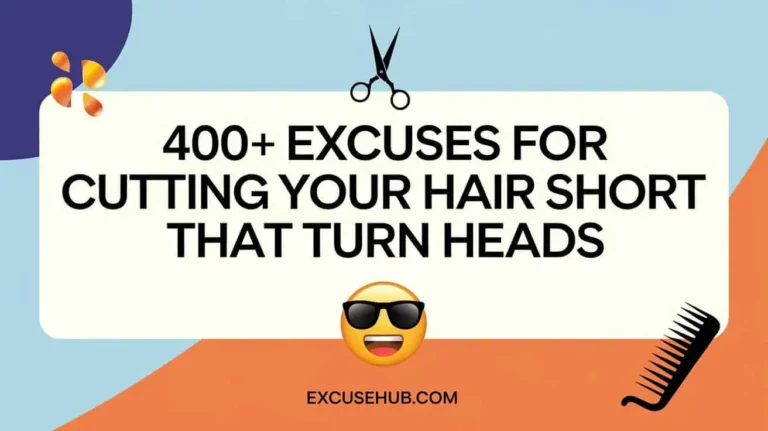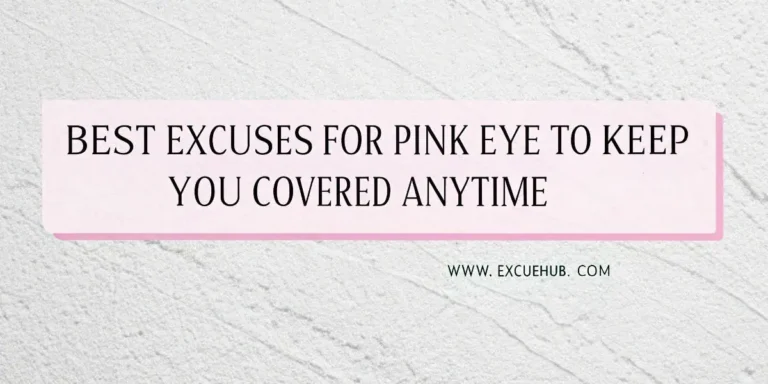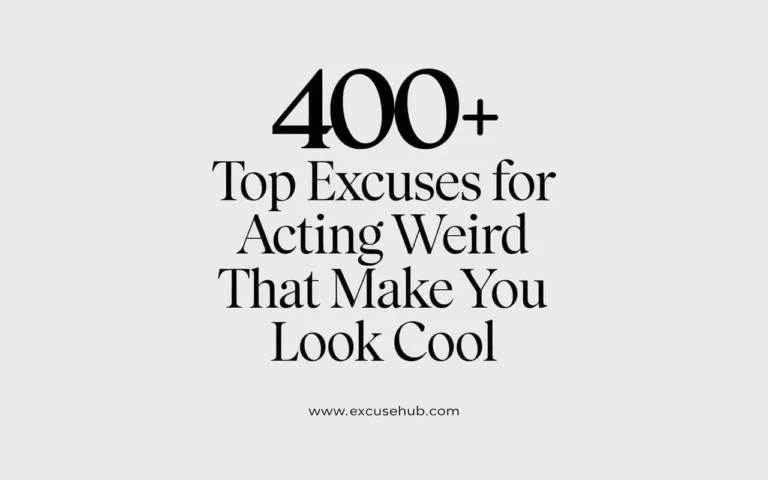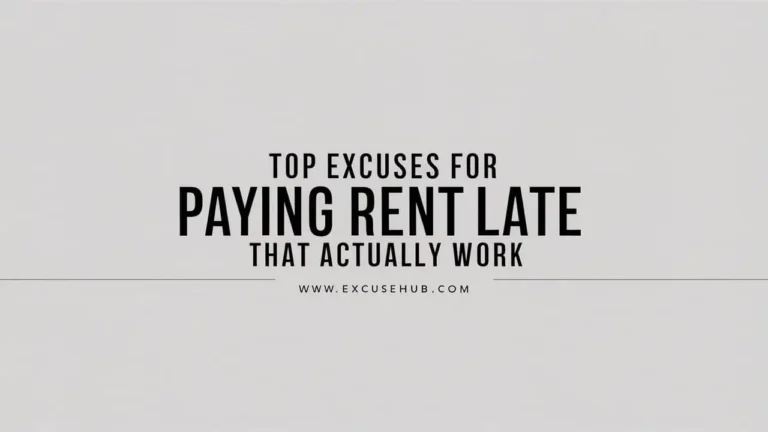Top Excuses for Overeating: Why We Overeat and How to Fix It
You often find yourself making excuses for overeating, from late-night cravings after a workout to emotional triggers or social pressures. Family gatherings can lead to guilt over food choices, while busy days can cause missed meals, prompting late-night snacks.
It’s easy to confuse hunger signals, particularly when stress and emotions come into play. Recognizing these patterns is key. There’s more to understand about these habits and how to manage them effectively.
Excuses for Overeating: Uncover the Truth Behind Our Habits

Overeating is something many of us struggle with, and sometimes, we come up with a list of excuses to justify it. These excuses may feel valid at the moment, but deep down, we all know it’s time to break free from them. Let’s take a look at 10 common excuses for overeating, and how we can overcome them!
1. “I’m too tired to cook, so I’ll just grab fast food.” ????????️
Excuse: When we’re exhausted after a long day, the thought of cooking can feel overwhelming. The convenience of fast food or takeout seems like a quick solution, and we end up overeating because of it.
Example: Imagine coming home after a hectic day at work. You’re too tired to prepare a healthy meal, so you order pizza, eat way more than you intended, and regret it afterward.
2. “I deserve a treat after a long week!” ????????
Excuse: After a tough or busy week, many people feel like they’ve earned a reward. This often leads to indulging in sugary or high-calorie foods as a form of self-care, but it can easily go overboard.
Example: It’s Friday night, and you’ve worked hard all week. You decide to treat yourself with a huge slice of cake and then keep going back for more, convincing yourself you deserve it. Before you know it, you’ve eaten way more than intended!
3. “I’m just really hungry right now!” ????️????
Excuse: Sometimes, we confuse hunger with cravings. When we feel hungry, we often reach for whatever’s in front of us without considering the portions or the nutritional value of what we’re eating.
Example: After skipping lunch, you find yourself ravenously hungry by dinner time. Instead of preparing a balanced meal, you grab a handful of chips and keep munching until you’re stuffed, not realizing how much you’ve eaten.
4. “It’s a special occasion, so I can indulge!” ????????
Excuse: Whether it’s a birthday, holiday, or a celebration, it’s easy to convince yourself that special occasions are the perfect time to overeat, thinking you’ll get back on track later.
Example: You go to a friend’s birthday party and, because it’s a special occasion, you go for seconds and thirds of cake and snacks, telling yourself it’s okay just this once.
5. “The food looks too good to pass up!” ????????
Excuse: When we’re surrounded by delicious-looking food, it can be hard to resist. The temptation to eat just a little more, even if we’re not hungry, often takes over.
Example: At a family gathering, the spread of appetizers looks irresistible. You keep sampling different dishes, even though you’re already full, simply because the food looks too delicious to resist.
6. “I’m emotionally eating to feel better.” ????????
Excuse: Emotional eating is a common response to stress, sadness, or boredom. People often turn to food for comfort, even when they’re not physically hungry.
Example: After a tough conversation or a stressful day, you find yourself reaching for your favorite comfort food—ice cream or chips—because it temporarily makes you feel better.
7. “I don’t want to waste food.” ????❌
Excuse: Sometimes we overeat because we feel guilty about leaving food on our plate, even if we’re no longer hungry. This often leads to eating more than we need to finish everything.
Example: You’ve ordered a large portion at a restaurant and are already feeling full, but you continue eating because you don’t want to throw away the leftover food, even though you’re already satisfied.
8. “I’ll start dieting tomorrow.” ????➡️????
Excuse: We often use the “tomorrow” excuse—telling ourselves we can eat whatever we want today because we’ll start being healthier or dieting the next day.
Example: After a week of eating fast food, you promise yourself that tomorrow you’ll begin a healthy eating plan. So, you end up eating an extra-large pizza that night, convinced it won’t matter because you’ll be “good” the next day.
9. “I’m just having a little snack.” ????????
Excuse: Sometimes, we think we’re just having a “small snack,” but before we know it, those little bites add up, and we’ve overeaten without realizing it.
Example: You open a bag of chips and tell yourself you’ll have just a handful. An hour later, you’ve finished the entire bag, and you’re feeling way too full.
10. “I don’t have time for a proper meal, so I’ll eat whatever’s quick.” ????⏱️
Excuse: When we’re busy, it’s tempting to grab something quick and easy, like a granola bar, candy, or chips. While it might save time, these quick choices can lead to overeating because they often aren’t filling.
Example: You’re running late for a meeting, so you grab a candy bar on your way out. A few minutes later, you’re hungry again and end up snacking on more unhealthy items throughout the day.
Now, you’ve got the top 10 excuses for overeating! It’s important to recognize these habits so you can begin making healthier choices. Keep in mind, breaking these excuses takes time, but with small changes, you can regain control of your eating habits!
Top 10 Most Believable Excuses for Overeating

We’ve all been there: reaching for that extra serving or grabbing a snack when we’re not even hungry. Overeating often feels justified, and many of us come up with convincing excuses to make it seem acceptable.
Whether it’s a celebration, stress, or simply the deliciousness of food, these excuses seem to make overeating feel like the right choice. In this post, we’re diving into the Top 10 Most Believable Excuses for Overeating, along with real-life examples. Let’s uncover the truth behind these habits and see how easily we can get trapped by them.
1. “I’m just hungry because I skipped breakfast.” ????????
Excuse: When we skip meals, especially breakfast, our body craves food later on, and we end up overeating to compensate.
Example: You rush out of the house in the morning and skip breakfast. By lunchtime, you’re so hungry that you grab more than you need, overloading on snacks and a larger-than-usual lunch to make up for it.
2. “I’m treating myself because I’ve been good all week.” ????????
Excuse: After staying disciplined with healthy eating for a few days, many feel they’ve earned a reward, leading them to indulge and overeat.
Example: After sticking to a strict diet all week, you reward yourself with a giant ice cream sundae. One sundae turns into two, because after all, you’ve been “good” all week!
3. “There’s just too much food, and I don’t want to waste it.” ????????
Excuse: The fear of wasting food can make us eat past the point of fullness, especially when we feel guilty about leftovers.
Example: At a family gathering, the table is piled high with food. Even though you’re already full, you keep eating because you feel guilty about throwing out perfectly good food.
4. “I didn’t realize how much I ate until it was too late.” ????????
Excuse: Sometimes, we mindlessly eat while distracted, and by the time we notice, we’ve already overeaten.
Example: While watching a movie, you snack on chips without really paying attention. By the end of the film, the entire bag is gone, and you didn’t even realize how much you’d eaten!
5. “It’s a celebration! I can’t not join in.” ????????
Excuse: During celebrations or events, the atmosphere makes us feel like overeating is acceptable, because everyone else is doing it too.
Example: At a wedding, the buffet looks amazing. Everyone’s enjoying themselves, so you dive in, eating more than you planned because it feels like part of the celebration.
6. “I didn’t eat enough throughout the day, so I’m making up for it now.” ????????
Excuse: If we don’t eat balanced meals throughout the day, we often feel the need to overeat at one sitting to make up for it.
Example: You didn’t have time for a proper lunch, so by dinnertime, you’re famished. You load your plate with more than you need, telling yourself it’s okay to catch up on those missed calories.
7. “I’m too stressed, and food comforts me.” ????????♀️
Excuse: Stressful situations can trigger emotional eating, leading to overeating as a way to cope.
Example: After a stressful workday, you find yourself reaching for a bar of chocolate or a bag of chips to comfort yourself, even though you’re not actually hungry.
8. “This food is too good to stop eating.” ????????
Excuse: Sometimes, the taste of food is so satisfying that we keep eating, even when we know we’re full.
Example: You order your favorite dish at a restaurant. It tastes so delicious that you lose track of how much you’ve eaten, and before you know it, the plate is clean, even though you’re already full.
9. “I’m just having a little snack, it’s nothing serious.” ????????
Excuse: We often convince ourselves that small amounts won’t hurt, but those little bites add up quickly.
Example: You grab a cookie “just to taste it” and then find yourself eating three more because they’re “small” and you don’t want to waste them.
10. “I’ve been working out, so I can afford to eat more.” ????️♀️????
Excuse: After exercising, we sometimes feel justified in overeating because we believe the extra calories burned mean we can eat whatever we want.
Example: You finish a tough workout and tell yourself you can eat a large meal afterward to reward yourself. You end up overeating because you feel you’ve “earned” it, even though your body doesn’t need that much extra food.
Recognizing these excuses is the first step toward breaking free from overeating habits. By understanding the real reasons behind why we overeat, we can start making healthier choices and avoid these common traps!
Common Excuses for Overeating at Social Gatherings and Celebrations

Social gatherings and celebrations often come with an abundance of food, and it’s easy to find yourself eating more than you intended. We all have those moments where we justify our overeating, but many of these excuses are just ways to cope with the situation.
Here’s a list of the most common excuses we give ourselves for overeating during social events, along with examples of how they play out:
1. “It’s a special occasion, so why not indulge?” ????????
Excuse: During celebrations, we convince ourselves that it’s okay to overeat because it’s a “special” day.
Example: At a birthday party, you tell yourself that it’s okay to eat an extra slice of cake since it’s a rare event. Before you know it, you’ve had a second and third helping because it’s “just one more bite” to celebrate.
2. “Everyone else is eating a lot, so I don’t want to stand out.” ????????
Excuse: Peer pressure can make us feel like overeating is the norm, especially when everyone else is indulging.
Example: At a holiday dinner, you see everyone around you grabbing more food, so you follow suit and pile your plate higher, even though you’re already full. You don’t want to be the odd one out!
3. “The food is so delicious, I can’t stop myself!” ????????
Excuse: Sometimes, the irresistible taste of the food at social events makes it hard to stop, even when you’ve had enough.
Example: The appetizers at the party are so tasty that you keep nibbling on them, even after you’ve already had a generous portion. The flavors are just too good to resist.
4. “I’m just having a little snack to tide me over.” ????????
Excuse: We often think of small bites as harmless, but those “little snacks” add up quickly.
Example: You tell yourself that one small handful of chips won’t hurt while you chat with friends, but soon enough, you’ve finished the entire bowl and don’t even realize how much you’ve eaten.
5. “There’s so much variety, I have to try everything!” ????????
Excuse: When a spread of delicious food is laid out, it’s hard to resist sampling a little bit of everything, even if you’re not hungry.
Example: At a buffet, you feel compelled to taste all the different dishes. One bite turns into a full plate as you “have to try” every option available.
6. “It’s an all-you-can-eat, so I’m getting my money’s worth!” ????????
Excuse: When dining at an all-you-can-eat restaurant or event, we convince ourselves that overeating is justified because we paid for the food.
Example: At an all-you-can-eat BBQ, you keep filling your plate with meats and sides, thinking, “I paid for this, so I’m going to enjoy it to the fullest!” By the end of the night, you’ve overeaten just to get your money’s worth.
7. “It’s just one more bite, then I’ll stop.” ????????
Excuse: We tell ourselves that one more bite won’t hurt, but that “one more” turns into several more.
Example: You have a plate of cookies and promise yourself you’ll stop after just one more. But that turns into two, then three, and before you know it, the plate is empty, and you’ve eaten way more than you planned.
8. “It’s been a long time since I’ve had this, so I deserve it.” ????????
Excuse: After avoiding certain foods for a while, we feel entitled to indulge when we finally get the chance.
Example: After months of avoiding your favorite cheesy dip, you finally get to taste it at a party. You feel justified in eating more because you’ve been craving it for so long.
9. “I’m full, but I don’t want to offend the host.” ????️????
Excuse: The desire to be polite or not offend the host can lead us to eat more than we need, even if we’re already full.
Example: At a family dinner, your aunt insists that you have seconds. Despite being full, you don’t want to upset her, so you take another helping, even though you don’t really want it.
10. “It’s a holiday tradition, and I can’t miss out!” ????????
Excuse: Holiday traditions often involve specific foods, and the nostalgia of those traditions makes us feel like we have to eat more.
Example: During Thanksgiving, you’re surrounded by family favorites. You eat more than usual because it’s part of the tradition, and you don’t want to miss out on the memories associated with the meal.
Top Excuses for Overeating After a Workout
After an intense workout, the temptation to overeat is real. Many of us feel justified in eating more than we need because we’ve just burned calories and worked hard at the gym. However, these excuses can lead to consuming extra calories that undo the hard work we put into our fitness routine.
Let’s take a look at some of the most common excuses people give themselves for overeating after a workout:
1. “I just burned so many calories, I deserve a treat!” ????️♂️????
Excuse: After an intense workout, it’s easy to feel like you’ve earned the right to indulge in something sweet or fatty as a reward.
Example: You’ve just finished an hour-long cardio session, and the first thought that comes to mind is, “I’ve earned this donut!” You convince yourself that a little indulgence won’t hurt after all the calories you’ve burned.
2. “I’m so hungry, my body needs it!” ????????
Excuse: Your body may feel hungry after exercise due to increased energy expenditure, but sometimes this leads to overeating because you feel like you need to replenish everything at once.
Example: After a long workout, you feel starving and grab a large meal, thinking that your body needs to recover all at once. The hunger is intense, so you eat more than you really need to fuel your recovery.
3. “I need to replenish my muscles with protein!” ????????
Excuse: The need to replenish protein after a workout is valid, but often this excuse is used to justify overeating.
Example: You’ve just finished lifting weights, and you grab a huge protein shake followed by a chicken sandwich. While protein is essential for recovery, it’s easy to go overboard with the portions when you’re overly focused on muscle repair.
4. “I worked so hard, I can afford it!” ????????
Excuse: The mindset of “I worked hard, so I can afford to splurge” is common after a workout, but it can lead to overcompensating by eating extra calories.
Example: After an hour of intense HIIT training, you grab fast food, thinking that the workout means you can eat whatever you want without consequences. You overeat because you feel like you’ve “earned” the indulgence.
5. “I haven’t eaten enough throughout the day, so now I need to catch up.” ????????
Excuse: If you didn’t eat enough earlier in the day, it’s easy to feel like you need to make up for lost calories post-workout.
Example: You didn’t have time for breakfast or lunch, so after your workout, you feel the need to eat a huge meal to catch up on the calories you missed. This often results in overeating, as you go overboard to make up for the earlier deficit.
6. “I’m just too tired, I need extra energy.” ????????
Excuse: After an exhausting workout, feeling tired can lead to cravings for high-energy, calorie-dense foods.
Example: After a long day at the gym, you feel drained and exhausted, so you eat a large plate of pasta or something with high carbs to “recharge.” The idea is that you need extra energy, but often you consume more than necessary.
7. “I deserve this because I pushed myself hard!” ????????
Excuse: People often associate intense effort with a reward. If you pushed yourself during a workout, you may feel entitled to a treat afterward.
Example: After crushing a tough workout, you justify a trip to the bakery, telling yourself you “deserve” the cake. The hard work feels like it should come with a reward, but this mindset can lead to overeating.
8. “It’s just a small extra snack, won’t hurt!” ????????
Excuse: After a workout, you might convince yourself that eating a small snack won’t hurt. But those extra bites can add up quickly.
Example: You’re feeling a bit peckish after your workout, so you grab a chocolate bar “just to satisfy your cravings.” One bar turns into two, and before you know it, you’ve consumed more than you originally intended.
9. “I’m so sore, food will help me recover!” ????????
Excuse: The idea that food can help with muscle recovery is valid, but it can sometimes be overdone by eating too much.
Example: Your muscles are sore from a heavy leg day, and you tell yourself that eating a hearty meal will help with recovery. You load up on extra portions, thinking more food equals faster recovery, even though your body only needs a balanced meal.
10. “One extra meal won’t make a difference.” ????????
Excuse: We often tell ourselves that one extra meal or a large portion won’t hurt after a workout, but it can quickly become a habit.
Example: After finishing your workout, you justify ordering a large burger with fries, telling yourself, “I’ll burn it off tomorrow,” even though it exceeds the calories you actually need for recovery.
Unrealistic Hunger Pangs: Common Excuses for Overeating
Sometimes, our hunger pangs feel exaggerated, and we justify overeating by convincing ourselves that we’re genuinely starving. In reality, these “unrealistic hunger pangs” are often fueled by emotions, habits, or excuses that lead us to eat more than our body truly needs.
Let’s explore some of the most common excuses for overeating when our hunger is far from genuine:
1. “I haven’t eaten all day, so I’m starving!” ????️????
Excuse: Skipping meals or going too long without eating can make our hunger feel extreme, but this can often lead to overeating when we finally eat.
Example: After skipping breakfast and lunch, you feel like you could eat an entire pizza. You convince yourself that you’re starving, but in reality, your body is just reacting to hunger cues from prolonged fasting.
2. “I’m emotional, and food will make me feel better.” ????????
Excuse: Emotional eating can lead to overeating, as we turn to food to cope with feelings like stress, sadness, or boredom.
Example: After a rough day at work, you find yourself reaching for comfort foods like ice cream or chips, even though you’re not physically hungry. You use food as a way to feel better, not realizing it’s not hunger driving the behavior.
3. “I deserve a reward, I’ve been so good all week!” ????????
Excuse: When we’ve been following a healthy routine, we often justify indulging in extra food as a reward for our good behavior.
Example: After a week of sticking to a healthy eating plan, you tell yourself that you’ve earned a big treat, like a large dessert or extra snacks. While you might have been good, this “reward” often leads to overeating because it’s not about actual hunger.
4. “I’m just craving something sweet!” ????????
Excuse: Cravings can feel intense, but they’re often psychological rather than driven by genuine hunger.
Example: You’re not hungry, but you feel an overwhelming urge to eat a cookie or chocolate. You convince yourself that you “need” it to satisfy the craving, even though you’re not truly hungry.
5. “It’s a party, and everyone’s eating, so I’ll join in!” ????????
Excuse: Social settings often encourage overeating, especially when everyone else is indulging, and we feel compelled to join in.
Example: At a friend’s party, you see everyone eating pizza and snacks, and you don’t want to feel left out. Even though you’re not really hungry, you grab a plate and start eating just because it’s part of the social experience.
6. “I’ll just eat a little more to feel full.” ????????
Excuse: Sometimes, we eat more than we need because we want to feel overly full, even when we don’t actually need the extra food.
Example: You finish your meal, but you’re still not “stuffed,” so you go back for a little more, thinking that feeling stuffed will make you feel satisfied. In reality, you’ve eaten more than necessary.
7. “I’m not sure when I’ll get food next, so I should eat now.” ⏳????
Excuse: The fear of not having enough food later can trigger overeating in the present moment.
Example: You’re about to go on a long car trip, and the thought of not being able to eat for hours makes you overeat at your current meal. You grab extra snacks because you’re not sure when you’ll eat again, even though you’re not hungry at the moment.
8. “It’s just a small extra serving, it won’t make a difference.” ????????♀️
Excuse: We often convince ourselves that one more serving of food won’t hurt, even though it pushes us past the point of fullness.
Example: You’ve had a nice dinner, but you’re tempted to eat a second helping of pasta. You tell yourself it’s “just one more serving” and that it won’t make a difference, even though it adds more calories than you need.
9. “I’m hungry all the time, maybe I need more food.” ????????
Excuse: Sometimes, we confuse true hunger with habits or cravings, leading us to think we need to eat constantly.
Example: You find yourself snacking frequently throughout the day, telling yourself that you’re always hungry. But in reality, it’s just habitual eating or boredom driving the need to snack.
10. “I didn’t eat enough earlier, so I need to catch up now.” ????????
Excuse: When we don’t eat enough earlier in the day, we feel the urge to make up for it later, leading to overeating.
Example: You skipped lunch because you were busy, and now that you’re home, you’re overeating dinner because you feel like you need to “catch up” on calories. This mindset often leads to consuming more food than your body actually needs.
Using Guilt From Family Dinner as an Excuse for Overeating
Family dinners are often full of love, tradition, and togetherness—but they can also bring about feelings of guilt, especially when it comes to food. This guilt can sometimes serve as a sneaky excuse to overeat.
When we feel obligated to finish everything on our plate or eat more than we need to please others, we may end up consuming extra calories that we didn’t originally intend to. Let’s explore how guilt from family dinners can become a common excuse for overeating.
1. “I don’t want to hurt their feelings by not finishing my plate.” ????️????
Excuse: It’s common to feel guilty when you don’t finish the food your family prepares, especially if they’ve gone to great lengths to cook a delicious meal.
Example: Your mom makes your favorite dish, and you’re full, but you can’t bear the thought of not finishing it. So, despite feeling satisfied, you keep eating to avoid disappointing her.
2. “I haven’t seen my family in so long, I have to eat everything to show appreciation.” ????????
Excuse: Sometimes, when we gather with family after a long time, we feel the need to eat extra to show our gratitude for the meal.
Example: After a long separation from your family, you sit down to a large family meal. You feel the pressure to clean your plate, thinking it’s the best way to show you appreciate the effort they’ve put into cooking.
3. “It’s a special occasion, so I can indulge!” ????????
Excuse: Special family gatherings often come with an unspoken rule that you can overindulge because the occasion calls for it.
Example: It’s your family’s annual Thanksgiving dinner, and you convince yourself that it’s okay to overeat just this one time because it’s a special celebration. You tell yourself you’ll “work it off later,” but you end up eating more than necessary.
4. “Everyone else is eating a lot, so I should too.” ????????
Excuse: When everyone else around you is indulging, it’s easy to feel like you need to follow suit, even if you’re not actually hungry.
Example: During a big family dinner, everyone’s piling their plates high with food. You don’t want to seem like you’re not participating, so you eat more than your body actually needs to fit in with the crowd.
5. “They made my favorite dish, I can’t say no!” ????????
Excuse: Family meals often feature your favorite foods, and the guilt of rejecting a dish made with love can lead to overeating.
Example: Your aunt has made her famous lasagna, and despite being full, you feel like you can’t turn it down. You load up your plate for the second time, feeling guilty if you don’t indulge in the dish that’s been specially prepared for you.
6. “If I don’t eat enough, they’ll think I don’t like the food.” ????????
Excuse: Sometimes, the fear of disappointing your family or feeling judged for not eating enough can lead you to eat more than you need.
Example: At the family dinner table, you feel pressured to eat extra portions so no one thinks you dislike the food. Even though you’re no longer hungry, you finish your meal to avoid any awkwardness.
7. “I’ve been dieting, I deserve to let go for one night!” ????????
Excuse: After a period of restricting yourself, family dinners may feel like the perfect opportunity to throw caution to the wind and indulge.
Example: You’ve been on a diet for weeks, and when family dinner rolls around, you tell yourself that you deserve a break. You eat past fullness, justifying it as a reward for sticking to your diet.
8. “I don’t want to seem rude by not eating what they made.” ????????
Excuse: Family often takes pride in the food they prepare, and you might feel bad if you don’t eat it. This can create guilt that leads to overeating.
Example: Your grandmother’s famous roast chicken is on the table, and despite being full, you feel guilty for not eating it. To avoid appearing ungrateful, you force yourself to eat more than necessary.
9. “I can’t resist, it’s all so delicious!” ????????
Excuse: The spread of delicious food can trigger the urge to eat more, and the guilt of not indulging can feel overwhelming.
Example: Every dish on the table looks amazing, and you can’t resist going back for seconds, even though you’re already full. The guilt of leaving food behind makes you overeat, thinking you’re “missing out.”
10. “It’s too much food to just throw away.” ????????
Excuse: You don’t want to waste food, so you eat more than you need just to avoid throwing it away.
Example: At the end of a large family meal, you notice a lot of food left on the table. You don’t want to be the person who throws it away, so you eat a little more to help clean up, even though you’re not hungry.
Common Excuses for Overeating Office Treats
Office treats—whether it’s a box of donuts, a birthday cake, or a bag of chips—are a regular part of workplace culture. While indulging in office snacks here and there is fine, it’s easy to let these treats turn into a daily habit, especially when we find ourselves making excuses to eat more than we actually need. Let’s explore some of the most common excuses for overeating office treats:
1. “It’s free, so I can’t say no!” ????????
Excuse: When snacks are free, it can feel like a missed opportunity to skip them, especially if you feel like you’re getting something for nothing.
Example: The office kitchen has a box of donuts that’s been left out for everyone. Since they’re free, you grab one (or two) thinking, “Why not? They’re free!”
2. “Everyone else is eating it, so I’ll have some too.” ????????♂️
Excuse: Social pressure in the office can often make you feel like you need to partake in the snacks to fit in with everyone else.
Example: Your coworkers are enjoying cupcakes during break time, and you feel like you can’t be the only one not eating one. To avoid feeling left out, you grab a cupcake, even though you’re not actually hungry.
3. “It’s a special occasion, so I can treat myself!” ????????
Excuse: When there’s a celebration or a milestone at the office, we often use it as an excuse to overeat, thinking it’s a one-time event.
Example: There’s a birthday celebration, and you tell yourself that it’s a special occasion. You go for a second slice of cake, even though you’re already full.
4. “I’ve been working hard, so I deserve a treat!” ????????
Excuse: After a busy or stressful period of work, you may feel like you’ve earned a reward and overindulge in the office snacks.
Example: You’ve been working late to meet a deadline, and when you see a bowl of chocolate treats on your desk, you think, “I deserve a break!” and end up eating more than you intended.
5. “I’m stressed, and food will help me relax.” ????????
Excuse: Office work can sometimes be stressful, and food becomes a way to cope with anxiety or pressure.
Example: After a tough meeting, you find yourself reaching for cookies or chips in the office kitchen. You tell yourself it helps to “de-stress,” even though it’s more of a habit than a true need for food.
6. “Just one more bite, and then I’ll stop.” ????????
Excuse: We often convince ourselves that one more bite won’t hurt, even when we’ve already eaten enough.
Example: You’ve already had a cookie, but you tell yourself that one more bite won’t make a difference. Before you know it, you’ve eaten several more without realizing it.
7. “I don’t want the food to go to waste.” ????️????
Excuse: You may feel guilty about wasting food, especially when there are leftover treats that seem to be going uneaten.
Example: There are a few leftover cookies from the office meeting, and you don’t want to see them go to waste. So, you end up eating them, even though you’re already full.
8. “I’ll work it off later.” ????♀️????
Excuse: You tell yourself that it’s okay to indulge in office treats because you’ll “work it off” later.
Example: After eating an entire slice of cake, you convince yourself that a quick workout later will balance things out, making it okay to eat more than you should.
9. “It’s just a small snack, it won’t make a difference.” ????????♀️
Excuse: We often justify eating office treats by convincing ourselves that it’s only a small amount, so it won’t really affect our diet or health.
Example: You have a small handful of chips, telling yourself it won’t hurt. But then, one handful turns into a second, and soon you’ve consumed far more than you intended.
10. “It’s part of the office culture, everyone’s eating!” ????????
Excuse: Office treats become ingrained in the culture, and it can feel like you’re not participating if you don’t eat them.
Example: Every afternoon, your coworkers grab a snack from the office kitchen. You don’t want to seem out of place, so you grab a handful of pretzels, even though you’re not hungry.
Apology Notes: Excuses for Overindulgence in Food
Here are some lighthearted and sincere apology note ideas for overindulgence in food:
- “The Food Was Too Tempting!” “I couldn’t resist the delicious spread, and before I knew it, I had eaten way more than I should have! Please forgive me for my overindulgence. I promise to make better choices next time!”
- “Oops, I Overdid It!” “I might have gone a little overboard with the snacks, but can you blame me? Everything was so tasty! I’ll work on my self-control next time. Thanks for understanding!”
- “Caught in a Food Frenzy!” “I had no idea how much I was eating until it was too late! Please accept my sincerest apologies for overindulging – I promise I’ll be more mindful next time!”
- “Overindulgence Alert!” “I may have gone overboard at the table – the food was too irresistible! I hope you can forgive me for my lack of restraint. I’ll be better prepared next time!”
- “I Got Carried Away!” “I couldn’t help myself – everything was just too delicious! I apologize for eating more than I should have and promise to show more restraint in the future!”
- “A Food Lover’s Regret” “I took the phrase ‘eat your heart out’ a little too literally today. Please forgive my indulgence – I’m learning to listen to my stomach and not my cravings!”
- “The Dessert Was Calling My Name!” “Dessert was too good to resist, and I may have eaten more than I should have. I apologize for overindulging and promise to be more moderate next time!”
These notes mix humor and sincerity, perfect for expressing regret for eating too much while showing your playful side!
Conclusion
In the labyrinth of late-night cravings and social feasts, it’s easy to find yourself ensnared by excuses for overeating that feel as comforting as a warm blanket.
Recognizing these rationalizations not only illuminates your relationship with food but also serves as a compass guiding you toward healthier choices.
By cultivating awareness, you can change those midnight munchies into mindful moments, steering your path toward balance and nourishment. Accept this understanding, and let it enable you to reclaim control over your plate.
Frequently Asked Questions
How Can I Stop Making Excuses for Overeating?
To stop making excuses for overeating, practice mindful eating by focusing on your food and portion sizes. Consider finding accountability partners who support your goals, helping you stay committed and aware of your eating habits.
Are There Healthier Alternatives to Late-Night Snacks?
When late-night cravings strike like a thief in the night, choose healthy snack options like Greek yogurt with berries or air-popped popcorn. These choices satisfy your hunger while nourishing your body, keeping you on track.
What Are the Psychological Factors Behind Overeating?
Overeating often stems from psychological factors like binge eating and stress eating. You might turn to food for comfort during tough times, seeking relief from emotions rather than physical hunger, which can lead to unhealthy patterns.
How Can I Identify Emotional Triggers for My Eating Habits?
To identify emotional triggers for your eating habits, practice emotional awareness. Keep a journal to note feelings before meals, and seek patterns. Trigger identification helps you understand why you eat, enabling healthier choices moving forward.
What Role Does Portion Control Play in Overeating?
Portion control’s like a magic wand; it changes your eating habits! By managing portion sizes and embracing mindful eating, you’ll uncover how to enjoy food while preventing overeating and nurturing a healthier relationship with meals.

